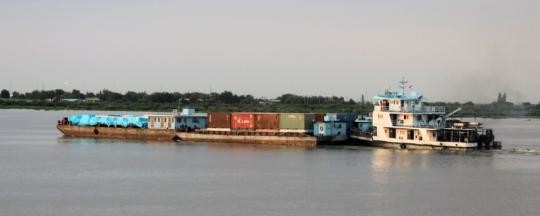South Sudan’s government has shut down the River Nile to food barges, preventing most humanitarian aid from reaching the Upper Nile state capital Malakal and the rebel-controlled west bank where tens of thousands of civilians face hunger.
According to a World Food Programme situation report from Friday, “deliveries by river [have been] suspended by government authorities for an indefinite period.” The situation report said barge movement has been “instrumental” in bringing large quantities of food to hungry South Sudanese citizens in a cost-effective manner.
Currently 30,000 displaced people are sheltering in a United Nations base in Malakal almost entirely dependent on food aid for survival. The USAID-funded Famine Early Warnings Systems Network says that civilians taking refuge in the Upper Nile counties on the river’s west bank face “crisis” levels of food insecurity this year, wherein even populations receiving food aid experience “high or above usual acute malnutrition.”
The last WFP barge to reach Malakal began offloading its cargo of 1400 metric tonnes of foodstuffs on 7 July. That food will last about six more weeks for the people living inside the Malakal UN base, which is the town’s only population center.
Without use of the Nile, humanitarians can only fly in supplies and people by air, yet they have been unable to land flights at the government-controlled airstrip in Malakal for nearly a month. Humanitarian flights require security assurances from local authorities on the ground in order to land.
“For now fixed wing aircrafts have not been able to land due to security concerns over the main Malakal Airport,” a WFP spokesperson told Radio Tamazuj. “The last time a WFP/UNHAS fixed wing aircraft landed in Malakal was on 26 June 2015,” he added, referring to the United Nations Humanitarian Air Service.
The WFP situation report blamed the lack of flights on “intermittent flight clearances.” A spokesperson for the United Nations Mission in South Sudan told Radio Tamazuj that clearing of unexploded ordnance “around the airport” in Malakal has limited flights as well.
Without barges or airplanes, helicopters are the one way to get food or other humanitarian assistance to Malakal. These have only been able to land at the helipads inside the UN’s base in Malakal, which is apart from the airfield, since 15 July.
Such helicopters can only carry two to three metric tonnes of food aid per flight, which may not be enough to deliver sufficient supplies when the last barge food shipment runs out.
The people living at the Malakal UN base require 700 metric tonnes of food aid per month, besides medical and other supplies. There are also larger populations of displaced civilians, mostly of the Shilluk ethnicity, on the rebel-controlled west bank of the Nile who depend on food assistance delivered through Malakal.
West Bank ‘cut off’ from humanitarian relief
Most humanitarians have been unable to reach the west bank for a month or more. “On-going insecurity in Upper Nile has continued to cut off humanitarian assistance to populations along the Nile, in particular on the west bank, including areas hosting large numbers of [displaced people] such as Wau Shilluk,” said child welfare agency UNICEF in a weekly situation report.
UNICEF said it has not accessed the west bank since late May, adding that almost one hundred humanitarians evacuated Upper Nile in the last two weeks due to ongoing insecurity.
Other humanitarians have only been able to send boats north from Malakal once in the last six weeks to reach needy civilians on the west bank of the Nile. This shutdown in river traffic follows an incident in mid-June when a humanitarian boat was shot at north of Malakal, according to media reports by the New York Times and France24.
Those media reports did not mention who was responsible for the shooting. The boat was returning to Malakal after delivering assistance to civilians in the rebel-controlled west bank village Wau Shilluk. The government army SPLA controls the river’s east bank.
Earlier this month, the International Committee of the Red Cross (ICRC), reported that some of its patients in the west bank town of Kodok died after its hospital came under attack. ICRC did not name the armed group responsible for the attack, but Kodok is likewise a largely Shilluk-populated town in rebel territory.
Radio Tamazuj has further learned that SPLA forces fired rocket-propelled grenades at a UN-contracted barge carrying diesel fuel north to Malakal over the Independence Day holidays. No one was injured but the barge suffered heavy damage, according to sources.
If you have information on harassment of humanitarians or restrictions on aid delivery in South Sudan, please send an email to Radio Tamazuj.




